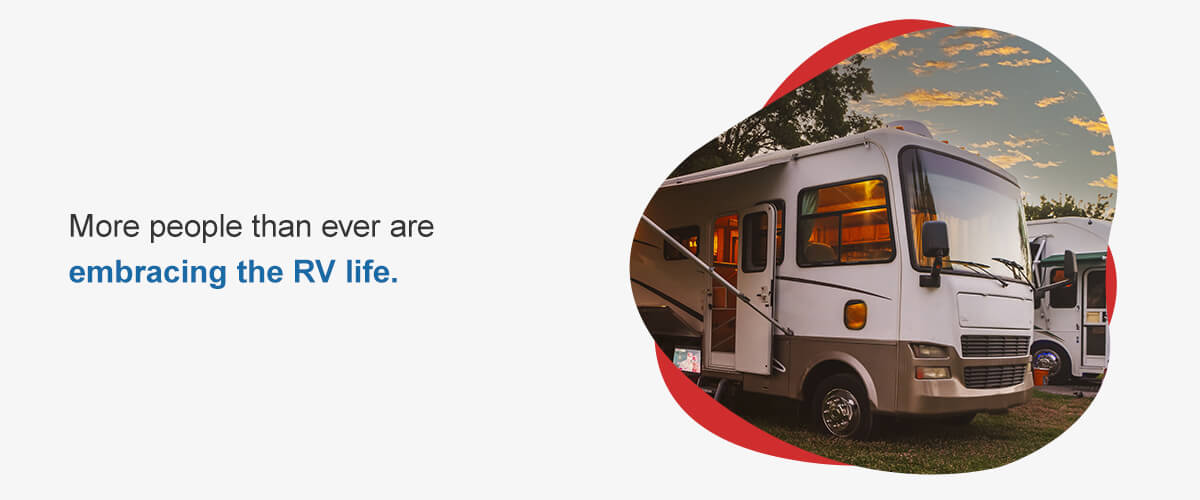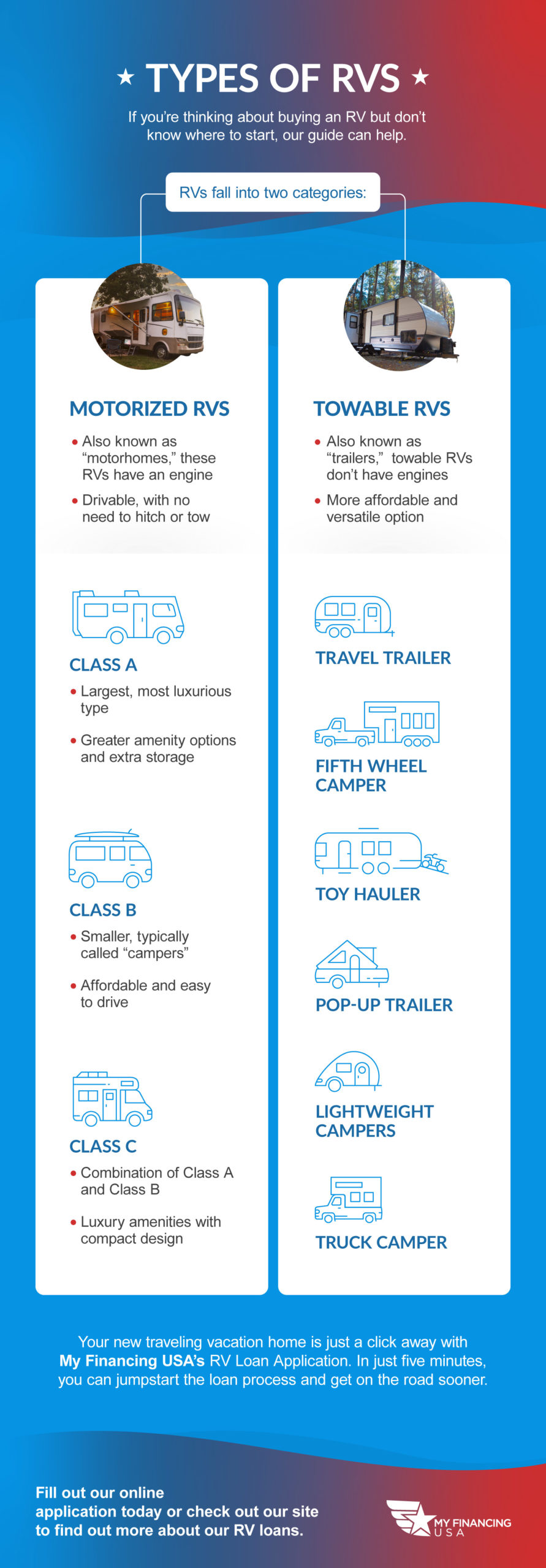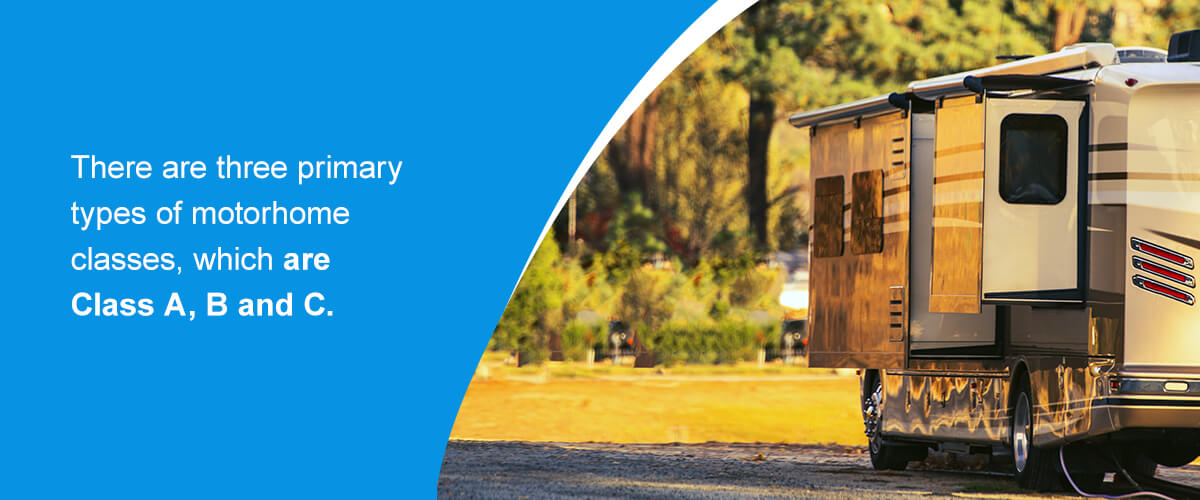Quick Navigation
- Motorized vs. Towable RVs
- Types of RV Motorhomes
- Types of Towable RVs
- Find Your Home Away From Home with My Financing USA
More people than ever are embracing the RV life. With the freedom to travel wherever your heart desires, explore new parts of the world and break away from the status quo, it's no surprise that RVs are growing in popularity in the digital age. If you're thinking about buying an RV but don't know where to start, our guide to different types of RVs and campers is here to pave the way.
There are several different types of RVs on the market. Your lifestyle, resources, travel plans and personal preferences will help you decide the best type of RV to buy for your upcoming adventure.
Motorized vs. Towable RVs
Campers, pop-ups, travel trailers — what's the difference? You have probably seen several types of RVs while traveling or camping without realizing that they are all part of the same family of vehicles.
RVs fall into two categories — motorized and towable.
Motorized RVs
Motorized RVs, also known as motorhomes, feature motors. They offer the benefit of driving and living under one roof. Unlike towable RVs, they don't require the extra work of hitching and towing the vehicle and your belongings from one place to another. Instead, you get to roll out of bed and jump into the driver's seat.
Depending on the class and size of the motorized RV, you can enjoy the same amenities that you have at home. Many motorhomes have kitchenettes, bathrooms, sleeping accommodations and plenty of outlets for your phone chargers and other plug-ins. These comforts make first-time RV owners feel at ease while traveling on the open road.
Towable RVs
Towable RVs don't have engines. You have to hitch them to another vehicle to get around. There are several types of towable RVs, ranging in size, shape and weight. These include travel trailers, fifth wheel campers, toy haulers, teardrop campers, pop-ups and truck campers.
Towables are a more affordable and versatile option than motorized RVs. Since towable RVs don't have their own engines, the biggest factor in choosing one will be your tow vehicle. Larger RVs will require bigger trucks to haul them around, whereas you can tow some pop-up campers with a car.
Types of RV Motorhomes
If you wonder about the different types of motorhomes and which one is right for you, we can help you make the distinction. While the terms "motorhome" and "RV" are used to describe every vehicle variation in this niche, there are significant differences between makes, models and types. So when you are shopping for a new RV, you need to know precisely the kind of class or structure that you want to maximize your time on the sales floor.
Understanding the benefits and disadvantages of all types of motorhomes will allow you to identify what features and amenities bring value to your travel and which ones you can do without. It's all about creating realistic expectations for your future travel plans while staying on budget and getting the most bang for your buck.
There are three primary types of motorhome classes, which are Class A, B and C. There are several differences between motorized RV class types.
Class A
Class A motorhomes are powerful and magnificent structures. They are the largest type of motorhome, and they provide luxury and comfort. Unlike conventional cars and trucks, most of these vehicles house their engines in the back of the coach to help push the RV down the road. This is why many people commonly refer to them as "pushers."
These motorhomes are incredibly spacious and come with many different amenities. Class A RVs can comfortably house up to ten people with ample living space and generous sleeping accommodations. If you're traveling long-term or with several people, then a Class A motorhome may be the right fit for you. However, a large motor vehicle with a heavy frame means more expenses for maintenance and fuel.
Class A RVs can range between 26 to 45 feet in length and weigh up to 30,000 pounds. If you aren't used to the size and weight of such a massive vehicle, there can be a steep learning curve when you first take it out on the road.
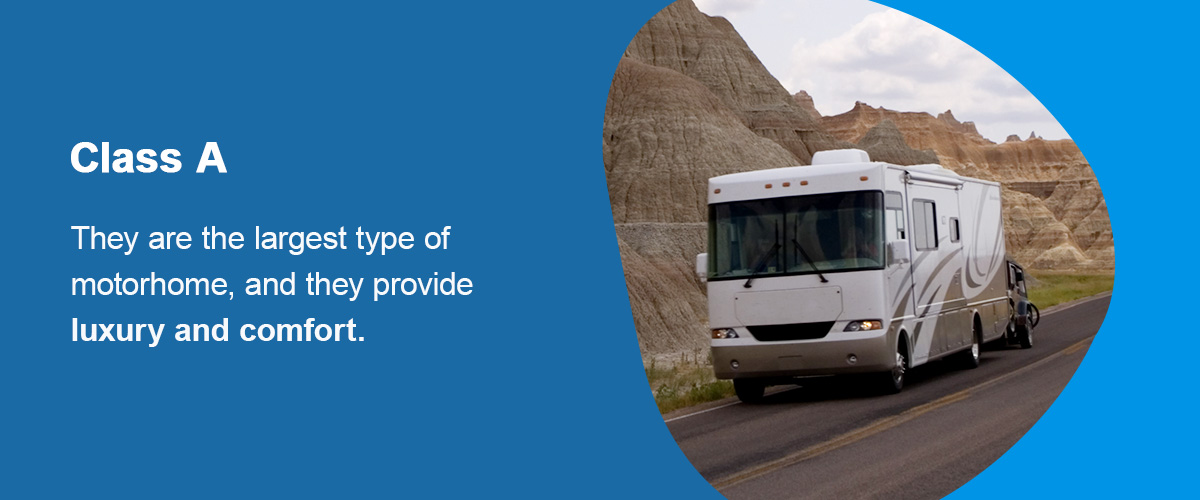
Some additional benefits to Class A motorhomes include:
- Large living areas.
- Convenience of traveling with one vehicle.
- Extra storage compartments.
- The luxuries of home while traveling.
- Greater amenity options, like laundry machines and bathrooms.
A few considerations to take for this class are:
- Higher costs, including maintenance and fuel fees.
- Less agility on the road.
- A special license, depending on your state.
- The need to tow a smaller car for running errands.
Class B
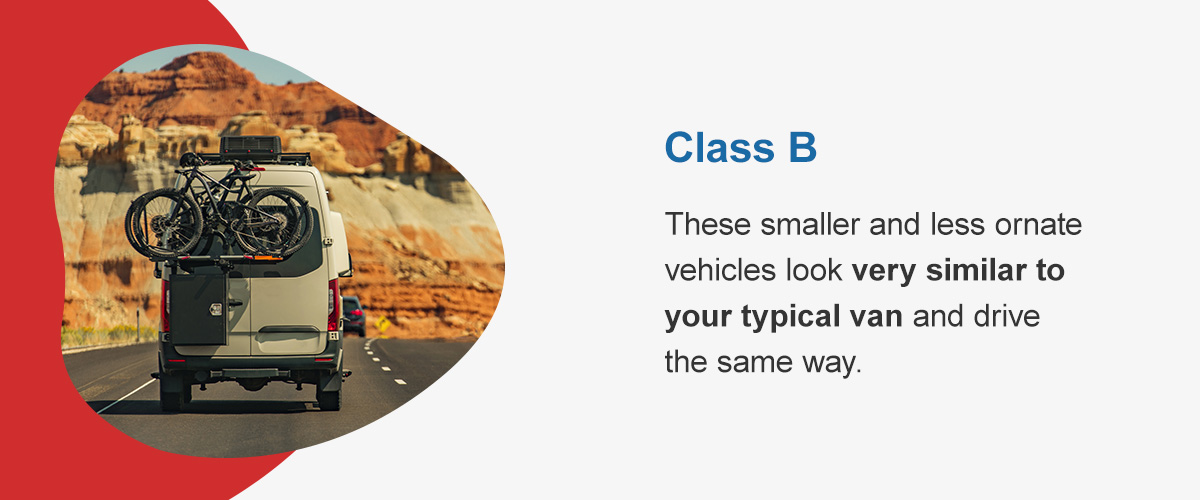
Although they are not as grand or spacious as Class A RVs, Class B motorhomes are becoming more common every year. This is primarily due to the increased interest in nomadic and tiny living. The challenge to eliminate unnecessary waste and stick with the essentials while taking on the open road has inspired hundreds of families and individuals. Many choose to travel for extended periods and embrace whatever adventures lie ahead.
These smaller and less ornate vehicles look very similar to your typical van and drive the same way. Class B RVs are built on a basic van chassis with a high roof, so you don't have to stoop down when walking around inside. While these smaller vehicles may not offer the same comforts as their Class A counterparts, they have better drivability. Their compact size makes it easier to maneuver narrower roads, especially when traveling through cities and towns.
Class B RVs tick all the boxes for convenience and affordability, but they do have their downsides. Standard Class B's have a queen-size bed and kitchenette, so four people are just about the most you can fit into the space. You'll also have to get accustomed to using a wet bath, which is a sink, shower and toilet combined into one tight space.
Pros to choosing a Class B RV include:
- Affordability
- Easy to drive
- Compact design
- Better gas mileage
- Eliminates the need for a second vehicle
Some cons you can consider when buying a Class B RV include:
- Less storage space.
- Smaller living space.
- Having enough room for only four individuals.
- Fewer amenities.
If you like to take spontaneous road trips with your partner or someone you don't mind living in close quarters with, a camper is a great vehicle to own.
Class C
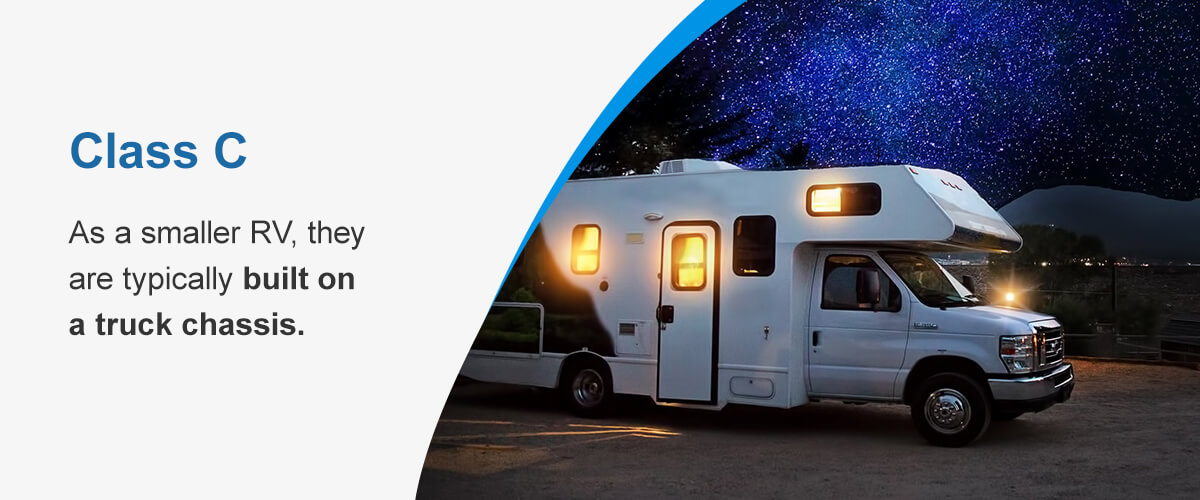
Class C motorhomes give you the best of both worlds. You get more amenities and furnishings similar to Class A types, with the compact design and drivability.
These motorhomes are identifiable by their cab-over structure, in which the back living area extends over the front of the vehicle to provide an additional bed or storage space. As a smaller RV, they are typically built on a truck chassis. You will have an easier time handling it on the highway and won't need a special license to operate it.
Class C motorhomes stand out among other RV vehicle types because the small 20 to 40-foot space offers similar comforts to Class A RVs. You get to enjoy kitchens, bathrooms, extra beds and ample storage space. The most significant downside to Class C RVs is that the fuel and maintenance costs lean towards the higher side.
The pros to this style of motorhome include:
- Affordability with luxury.
- Drivability.
- Additional storage compartments.
- Diesel and gas options.
- Plenty of floor plans to choose from.
Some other considerations include:
- Greater maintenance costs.
- A higher price than larger towable counterparts.
- A lower miler per gallon (MPG) than Class Bs.
- Less suspension, which leads to bumpier rides.
You may need a second vehicle to access certain roads and shops, depending on the size.
Types of Towable RVs
Perhaps moving around in a large motorhome isn't your style, or maybe you like the convenience of being able to park your living space and still travel on day excursions. Whatever the case may be, there are clear advantages to owning a towable RV that you can't get with a motorhome.
Unhitching your trailer for the free use of your car or truck in any city or town is the primary benefit of towable RVs. Having more options for floor plans and size with a significantly lower price tag makes these options distinct in the market.
Aspiring RV owners often ask the same questions — what are the different types of RVs? Can I use a standard hitch for all types of RVs? There are multiple different types of campers and RVs, and this in-depth explanation will show you the pros and cons of other RVs so you can choose a towable that fits your needs and budget.
Travel Trailer
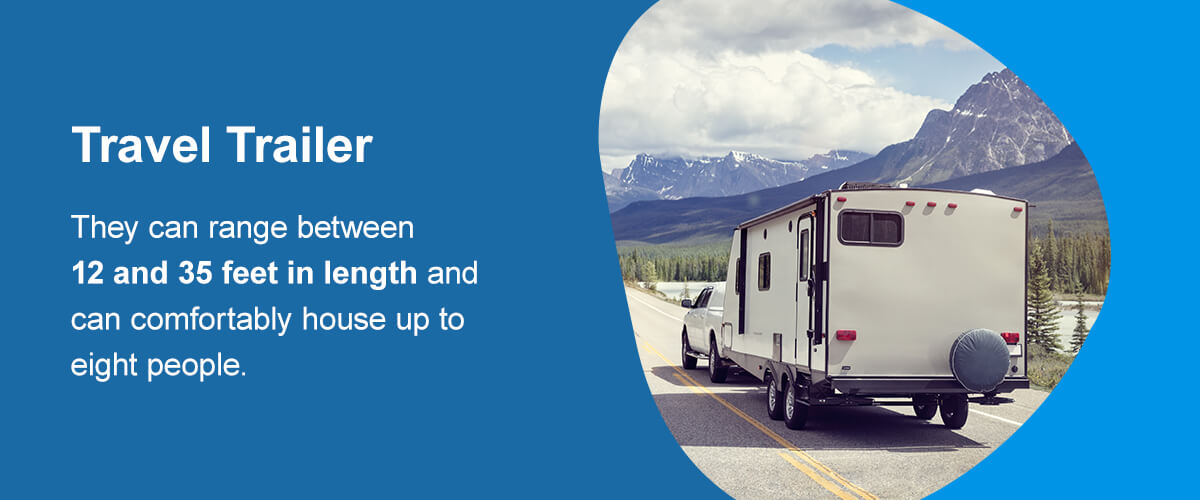
Travel trailers are familiar campground favorites for a good reason! You can find travel trailers in nearly every size and shape. They can range between 12 and 35 feet in length and can comfortably house up to eight people. There are many floor plans to choose from, so you can find a model that fits your personal needs. The price comparison to most all types of motorhomes in the Class A and C categories is substantial.
Larger travel trailers can come fully furnished with the works. With multiple bedrooms, full baths and large kitchens complete with a refrigerator and oven, they provide home comforts with enough room left over to host friends and family. If you're working with a smaller budget, you can still enjoy traveling in style with modest kitchen accommodations and sleeping arrangements for two to four people. These RVs are popular because they often feature exterior storage compartments and extendable awnings perfect for barbequing and hosting friends.
One of the downsides to shopping for a towable trailer is your options are limited to the size and weight of your car or family vehicle. Since travel trailers can range between 1,200 to 10,000 pounds, you will have to purchase a travel trailer that you can easily pull with your vehicle. Fortunately, there is an apposite travel trailer for every size car.
Other pros for travel trailers include:
- Plenty of options to choose from when it comes to size.
- More affordable than its motorhome counterparts.
- There is a travel trailer for every family car.
- Amenities similar to those offered in Class A motorhomes.
- Easy to set up.
- Many offer walls and doors between rooms for privacy.
Some general cons to look out for when shopping are:
- You need to know how to navigate turning and driving with a large unit in tow.
- You need to check the hitch at every road stop.
- Most states don't allow passengers to ride inside the travel trailer.
- Some road conditions make it difficult to travel with a large trailer.
Fifth Wheel Camper
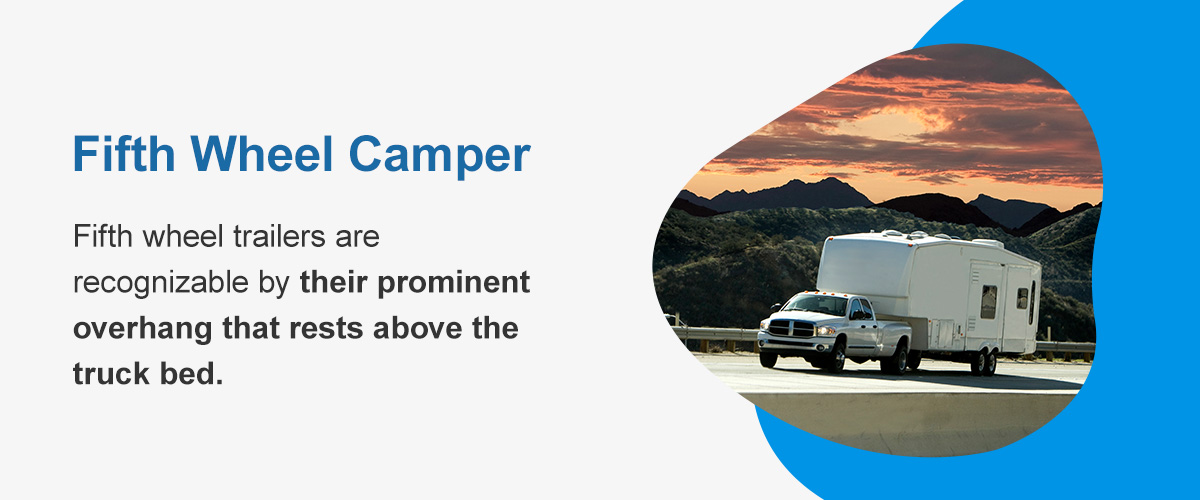
Fifth wheel trailers are the largest type of towable RV, as well as the most expensive. They are comparable to Class A motorhomes, featuring lush interiors with a generous amount of space. These trailers can be massive, ranging from 20 to 40 feet in length. This also means that you will need a large truck and a fifth-wheel hitch, to haul it around.
Fifth wheel trailers are recognizable by their prominent overhang that rests above the truck bed. This extra space is usually transformed into a bedroom suite or living space. These campers are large enough to feature full-size kitchens and bathrooms and separate bedrooms that can sleep up to eight people. This makes fifth wheel campers a great travel and camping solution for large families and extended trips.
If these features weren't enough to convince you of how amazing fifth wheel RVs are, the amount of storage space will. Unlike other types of campers and RVs, fifth wheel trailers have large basements. Many fifth wheel trailers also come complete with at least one patio awning, elevated ceilings, heating and air conditioning and split-level living space. Rather than opting for a hotel room or tent when going on vacation, you essentially have a ranch-style home wherever you go.
There are plenty of pros to these powerful vehicles, such as:
- Lavish interior fixtures and conveniences.
- Full-size rooms, kitchen units and bathrooms.
- Affordable in comparison to motorized options.
- Multiple floor plans to choose from.
- Incomparable interior and exterior storage space.
- Sturdier than other towable RVs when traveling.
The downsides to choosing a fifth wheel are:
- You may need a special attachment and a large vehicle to tow it.
- This vehicle needs more maintenance than smaller RVs.
- The large size makes it difficult to drive in traffic.
- This is one of the most expensive types of towable RV.
Toy Hauler
Toy haulers are RVs with an additional garage section in the rear that's perfect for transporting motorcycles, kayaks, side-by-sides, ATVs and other toys. With a ramp door, you can easily pack and haul your powersports vehicles securely from one place to the next.
You don't have to have toys to get the most out of a toy hauler. These RVs measure between 20 to 40 feet in length, so the additional garage space can easily be converted into an office, extra bedroom or living space.
Normal wear and tear is normal in any RV, but transporting motorcycles and ATVs can lead to unwanted grease stains and mud. While you can take the chance of hauling your powersports vehicles another way, toy haulers are specially designed with tie-down anchors, protective wall paneling and water and oil-resistant flooring. Many towaways can be customized with fold-away beds in the garage space, as well as entertainment centers.
There is a common misconception that toy haulers can smell like fuel fumes from carrying smaller vehicles. However, most toy haulers feature a solid wall, known as a vapor wall, that reduces odors caused by transporting your powersports vehicles and separates the garage from the living areas.
You can choose a toy wheeler in multiple styles, including fifth wheel trailers, travel campers and even motorhomes.
The overarching pros of toy haulers include:
- The ability to tow powersport vehicles.
- Rear ramp doors that can double as a patio.
- When empty, the garage space can be used as an extra room.
- Layout customization options.
- Sleeps up to 12 people.
There are only a few considerations to toy haulers:
- Toy haulers weigh more than other types of RV campers.
- You need a heavy and powerful truck to haul it.
- More expensive than non-toy haulers of the same size.
- Are very large and can be difficult to maneuver.
- Unnecessary if you are not traveling with powersports equipment or a large group.
Pop-Up Trailer
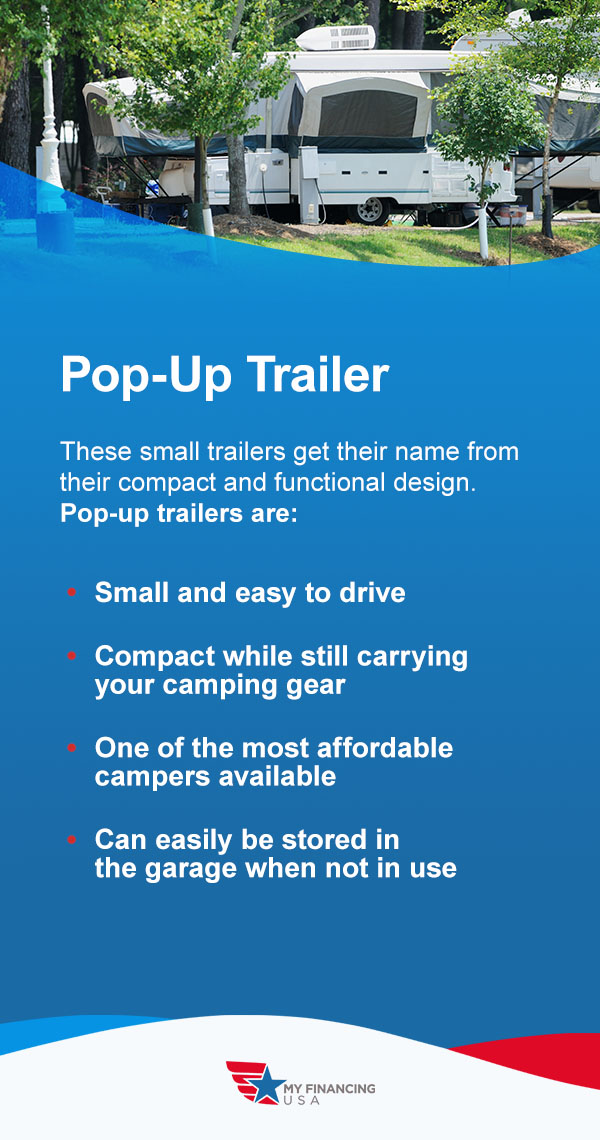
If you don't want to commit to a sizeable towable RV or don't need glitz, glam or space, then a pop-up camper might be the right fit for you! These small trailers get their name from their compact and functional design. When stored away, the compartments neatly fold into themselves as a self-made storage unit. When you're ready to set up camp, they expand into a full camper.
Pop-up campers can comfortably fit up to six people, sometimes eight, when you have a larger unit. The downsides to this trailer are minimal if you're using it in a suitable climate. The canvas and netting lining means there's no insulation, so the temperature inside the camper reflects the outdoors. Since this is a collapsible RV, you need to manually set it up and break it down with every use.
Pop-up trailers are:
- Small and easy to drive.
- Compact while still carrying your camping gear.
- One of the most affordable campers available.
- Can easily be stored in the garage when not in use.
Lightweight Campers
What are the types of RVs that can sustain minimalist living without requiring a heavy truck to tow? The answer would be lightweight campers! These small RVs are made from light materials, so they are aerodynamic and easy to pull with a regular SUV or sedan.
From teardrop trailers to ultra-light campers, each towable offers the feeling of home with a bed, kitchenette and even a wet bath. They are the perfect size for the solo traveler or a getaway for two.
These campers are:
- Easy to drive with.
- Perfect for short trips.
- Hitches to smaller cars.
- Affordable.
The only potential setbacks are that the lightweight materials are less insulated, and each camper can only fit about four people. Depending on your needs, this compact option could be best for you.
Truck Camper
Truck campers are another lightweight camper, suitable for anyone who wants a cost-effective road trip. These campers fit directly into a truck bed, making them ultra-compact and easy to drive.
You only need to register your truck camper as an RV in the following nine states:
- Idaho
- Indiana
- Mississippi
- Nebraska
- Oregon
- Rhode Island
- Tennessee
- Utah
- Washington
All other states classify truck campers as cargo due to their small size. Even though they're the smallest RV available, they still provide cozy accommodations such as a bathroom, bed and kitchen. That said, this RV is best for solo travelers.
The main drawback to a truck camper is the weight and height, which can reduce your truck's fuel efficiency and limit visibility while driving.
Find Your Home Away From Home with My Financing USA

Your new traveling vacation home is just a click away with My Financing USA's RV Loan Application. In just five minutes, you can jumpstart the process and cut right to the bottom line so you can get on the road sooner. Within 72 hours, you'll hear from one of our experts who will help establish your goals and find the most competitive on the market.
When it comes to traveling with loved ones and creating lasting memories, why waste time? Fill out our online application today, or check out our site to find out more about our RV loans.


